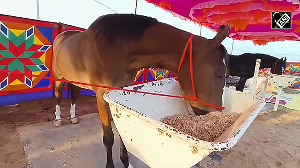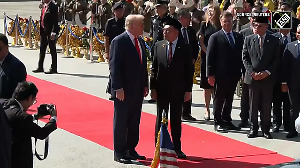"I think more Russian-Chinese military exercises will be held, and other members of the Shanghai Cooperation Organisation will probably take part in them, including countries with observer status like India," Russian Defence Minister Sergei Ivanov told state-run Rossia channel on Monday night.
Russia, China stage joint military exercise
In October, India and Russia are poised to hold their first-ever joint army drill involving dropping of elite paratroopers in Rajasthan's Aravali hills to destroy a 'terrorist' base.
A leading daily on Monday reported that Russia, China and India plan to conduct a new joint military exercise following the Russian-Chinese Peace Mission 2005 manoeuvres.
India, Russia to show military might
Nezavisimaya Gazeta newspaper wrote that Andrei Kokoshin, a former secretary of the Russian security council and a sitting member of the parliament said the forthcoming exercise could be part of a Russia-China-India triangle and the increased activity of the SCO.
The SCO clubs Kazakhstan, China, Kyrgyzstan, Russia, Tajikistan and Uzbekistan as permanent members, and includes India, Pakistan and Mongolia as observers.
"The exercise might focus on maintaining stability in central Asia and ensuring the security of oil supplies via sea routes," Kokoshin said.
According to an unnamed Russian general quoted by the daily, the exercise could be conducted as early as in 2006.
"The structure of the Russia-China-India triangle is becoming more rigid. China has made the transition from its former policy of confrontation and, sometimes, bloody border clashes with its neighbours in the north and in the south to a policy of partnership," the daily observed, adding that the rapidly growing Chinese economy needs stability.
"Another sphere of mutual interest is the fight against international terrorism. Russia in the Caucasus, India in Kashmir, and China in Xinjiang have to deal with Islamic terrorists and extremists, whose main bases are in Pakistan and Afghanistan," the daily said.
The idea of Russia-India-China triangle was first floated by Russia's then premier, Yevgeny Primakov in 1998 during a visit to New Delhi.
"At that time, many experts believed it was a utopian idea because existing antagonisms ran too deep. However, inter-state relations are gradually changing and creating possibilities for military partnership as well. In addition, all three countries "share the desire" to counter the U.S. strategy of a unipolar world by creating their own centre of power, Nezavismaya Gazeta said.





